Prepping in a Tight Economy
In today’s world, prepping has become more than just a hobby for survival enthusiasts. It’s a strategy for anyone looking to ensure their family’s safety in the face of economic instability, natural disasters, or other emergencies. However, in a tight economy where every dollar counts, the approach to prepping needs to be both strategic and frugal. I have spent many years prepping. Some years were tight, and some years were plentiful, moneywise and I had to adjust as each year unfolded. Maybe you’ve also experienced the cycle of lean years and more robust financial years. If you have any tips to add to this, let me know so I can pass your ideas on to my faithful readers!
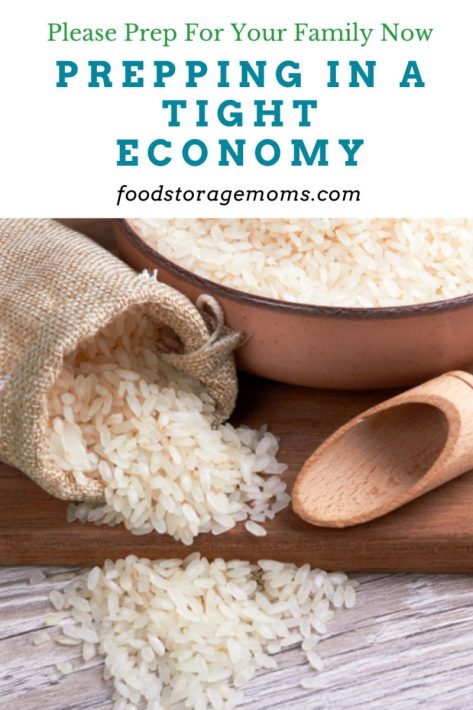
Assess Your Needs and Prioritize
The first step in prepping is understanding what you need and setting clear priorities. I want to share some ways you can assess your needs and prioritize them. All of us have things we consider essentials like food, clothing, and shelter. How we establish what are true needs and what could be considered wants can become a very personalize challenge. Setting priorities and living within our means takes planning and discipline. Here are some things to take into consideration:
- Identifying Potential Threats: Depending on your location and personal circumstances, the types of emergencies you prepare for may vary. Common scenarios include natural disasters, power outages, economic downturns, personal health and safety, and supply chain disruptions.
- Evaluating Essential Needs: First, focus on the basics—food, water, shelter, and medical supplies. Determine how much of each you need based on your household size and the duration you want to be prepared for.
- Making a Priority List: Once you have a clear picture of potential threats and essential needs, prioritize your list. Start with the most crucial items for survival and work your way down.
Budget-Friendly Food Storage
Food is one of the most critical components of any prepper’s stockpile. When it comes to food, I make sure I stockpile as much as I can!
- Bulk Buying: When you purchase your groceries at the local grocery store be sure to stock up on non-perishable items. You can often save money if you shop at warehouse stores. Keep your eyes open for sales like the common caselot sale. Staples like rice, beans, pasta, and canned goods have long shelf lives and are cost-effective. List of the Best Food Storage Supplies for Us
- Home Preservation: Learn basic preservation techniques such as canning, drying, and pickling. Growing your own fruits and vegetables and then preserving them can significantly reduce costs if you have room for a garden.
- Couponing and Sales: Keep an eye out for discounts and coupons. Combining these with sales can help you acquire items at a fraction of their regular price. List of the Best Food Storage Supplies for Us
- Rotate Your Stock: Use the FIFO (First In, First Out) method to ensure nothing goes to waste. Consistently rotate and consume older items while replacing them with new purchases. Tips for Understanding How to Rotate Foods
Water Storage and Purification
Access to clean water is vital, but it doesn’t have to be expensive. Water is one of the most important things you will ever have for an emergency. You’ll need water to stay hydrated, do some cooking, provide for personal hygiene, and do limited laundry chores. If you’ve dehydrated food as part of your preparation plans, you’ll need water to rehydrate and use those foods.
- Storage Solutions: Use food-grade BPA-safe containers to store water. Large plastic drums or even repurposed soda bottles can work well. Aim to store at least one gallon of water per person per day. How To Store Water-Pros And Cons
- Purification Methods: Invest in affordable water purification options like tablets, bleach, or portable water filter systems. Learning to purify water from natural sources can also be invaluable. Purified Water vs. Spring Water: The Differences
- Rainwater Collection: If local regulations permit, setting up a rainwater harvesting system can provide a sustainable water source. How to Use Rain Water at Home
Affordable Shelter and Heating Solutions
Maintaining warmth and a secure shelter during emergencies is crucial. There are many ways to make sure you have affordable shelter and heating solutions!
- Insulate Your Home: Improve your home’s insulation to reduce heating costs and ensure it stays warm during power outages. Simple steps like sealing windows and doors can make a significant difference. What to Use for Insulation to Stay Warm
- Alternative Heating: Consider cost-effective heating options like wood stoves, fireplace inserts, or propane heaters. Ensure you have proper ventilation and safety measures in place. What is the Best Firewood for Home Heating?
- Emergency Shelters: Have materials ready to create a makeshift shelter if needed. Tents, tarps, and sleeping bags are affordable and can be life-saving in a pinch. How to Use a Tarp for Shelter
- Consider getting a programmable thermostat and learn how to effectively use it. Turn the AC and furnace to a reasonable temperature when your home or apartment is empty, like during work and school hours. Also, adjust the temperature when you’re sleeping. Utilities can be expensive, so lower that electric utility bill by turning off the lights when you leave a room. Turning off devices that use power just by being plugged in like a TV, computer, and printer can save electricity.
Building a Frugal Emergency Kit
An emergency kit should be comprehensive but doesn’t need to be expensive. I have put together many kits over the years and shared all my success tips on the blog.
- DIY Kits: Assemble your emergency kits instead of buying pre-made ones. You can often find cheaper alternatives or use items you already have at home. What You Need In Your 72-Hour Kits Today
- Second-Hand Gear: Check thrift stores, garage sales, and online marketplaces for gently used gear such as backpacks, flashlights, and camping equipment. Best Prepper Gear: Big Items to Save For
- Multi-Use Items: Focus on items that have multiple uses. For example, a multitool can serve numerous functions, and bandanas can be used for first aid, sun protection, or as a makeshift mask. Invaluable Tools Necessary for Transporting Emergency Supplies
Health and Medical Supplies
Health is paramount, so having the right supplies on hand is essential. As I get older, I’ve learned that if you don’t have your health, then you have nothing. Make sure you are prepared for medical emergencies that may come your way during a disaster.
- Basic First Aid: Start with a basic kit and gradually add items specific to your family’s needs. Include over-the-counter medications, bandages, antiseptics, and personal prescriptions. Types of Medicines You Need for a First Aid Kit
- Learn Basic Skills: Knowledge can be as valuable as supplies. Take basic first aid and CPR courses, many of which are free or low-cost. First Aid for Outdoor Adventures
- Generic Brands: Purchase generic brands for medications and supplies to save money without sacrificing quality.
Financial Preparedness
Economic downturns can have a significant impact on your ability to prep. However, I’m in my 70s, and I’ve learned how to use all of these. We never know how our lives can be impacted. It doesn’t take natural disasters to wipe out our financial goals. The loss of a job, a medical emergency, or the death of a family member can directly affect our monthly income and monthly spending. The amount of money available can change in an instant, so do some planning now, just in case.
- Emergency Fund: Aim to build an emergency fund that covers at least three to six months of monthly payments for living expenses. Even small, regular contributions can add up over time as you strive to meet savings goals.
- Debt Management: Prioritize paying down high-interest obligations like credit card debt to free up more of your income for essential prepping supplies. How To Get Out Of Debt And Stay That Way
- Budgeting: Create a budget that includes a category for prepping. Track your expenses and adjust as necessary to ensure you stay on track. How To Cut Your Budget When You Think You Can’t
- Subscriptions: Whether it’s for cable, streaming services, music downloads, cell phone services, and more, look for less expensive options or just cancel them altogether if things get really tough and you’re on an extremely tight budget. We all place the need for entertainment as important, but there are limits.
- Using Cash: Consider using cash for day to day expenses rather than a debit card or your checking account. Once the money is gone, it’s gone. When you get your paycheck, convert it to cash, place the funds in a series of envelopes, and eliminate the chance of overspending beyond what you have.
Community and Skill Building
Being part of a community and having a diverse skill set can be as crucial as physical supplies. Getting to know your neighbors and learning new skills isn’t bad! You can even figure out how to barter and trade.
- Network with Neighbors: Building relationships with neighbors can provide mutual support in times of crisis. Consider forming a local prepping group to share resources and knowledge. Neighbors-It’s Critical We Get To Know Them
- Learn New Skills: Learn practical skills such as gardening, home repair, and basic mechanics. These skills can save you money and be invaluable during emergencies. Home Economic Skills You Should Teach Your Kids
- Bartering and Trade: Develop a network for bartering goods and services. This can be particularly useful during economic hardships when cash flow is tight. 50 Items You Need In Order To Barter
Be Willing to Make Some Tough Decisions
We don’t have to be living on what might be considered “low income” to find things are financially tight right now. Food, rent, car maintenance, and other expenses have all gone up over the past few years. It might come to the point where we have to make some challenging decisions.
- Be willing to eat more meals at home. It’s fun to eat out, but you should be able to prepare meals more cost-effectively by preparing home meals. Take a lunch to work rather than eating out. Have a fun BBQ rather than going out for burgers or steaks.
- Evaluate options for your living space. Could you share your home with family members to get extra cash to cover your mortgage or rent? Some families have decided to share space and expenses as way to save money in the long run since housing costs keep going up.
- Relocate to a less expensive community. We’ve seen Utah become an expensive place for families to live. We had friends move to a small community in South Carolina close to other family members due to the lower cost of living.
- Could new or extra vocational training help you earn more income? The trades are paying higher wages than in years past, maybe it’s worth a look.
- Do you have the time and energy to take on a “side hustle?” The thought of a second job is daunting, but maybe it’s a necessary step so you can more easily meet your monthly expenses every calendar month. Part of a realistic spending plan is evaluating income sources and improving income besides limiting the outgo.
More Tips
- Very Basic Steps for Starting Emergency Prepping
- Prepping for When Flooding Strikes
- 20 Tips For Feeling Less Stress While Prepping Food Storage
Final Word
Prepping in a tight economy requires careful planning, prioritization, and a focus on frugality. Taking the time to assess your needs, finding budget-friendly solutions, building a strong community, and maintaining a proactive mindset are all necessary. You can ensure that you and your family are prepared for whatever may come your way if you’re willing to evaluate and possibly take the steps outlined above. May God Bless this World, Linda
Copyright Images: Rice in Bowl On Wooden Background Depositphotos_676518608_S By Pioneer111,

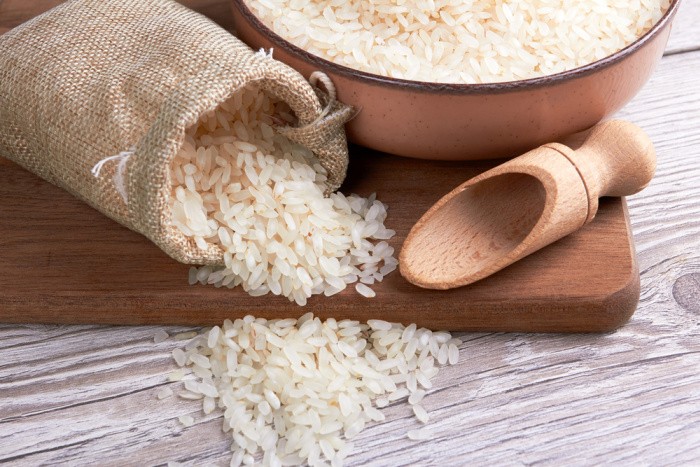

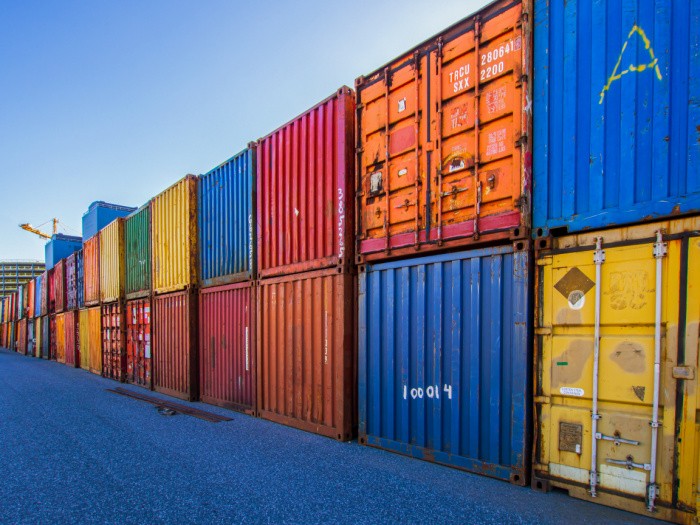

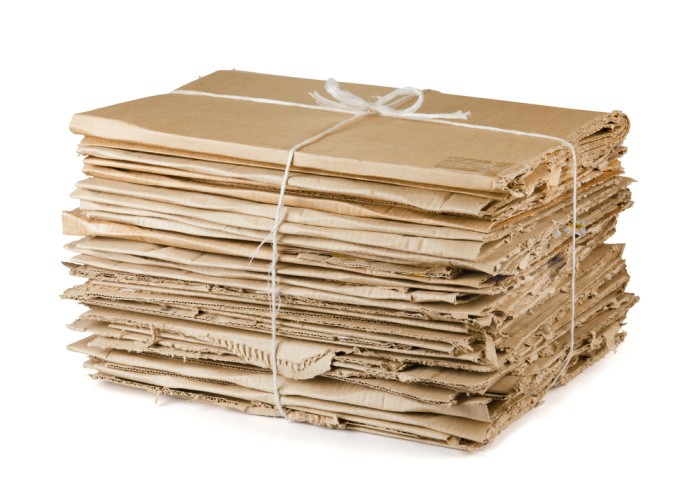
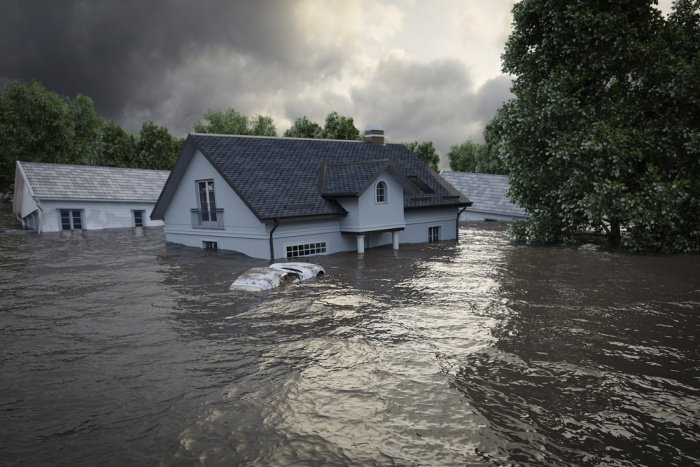

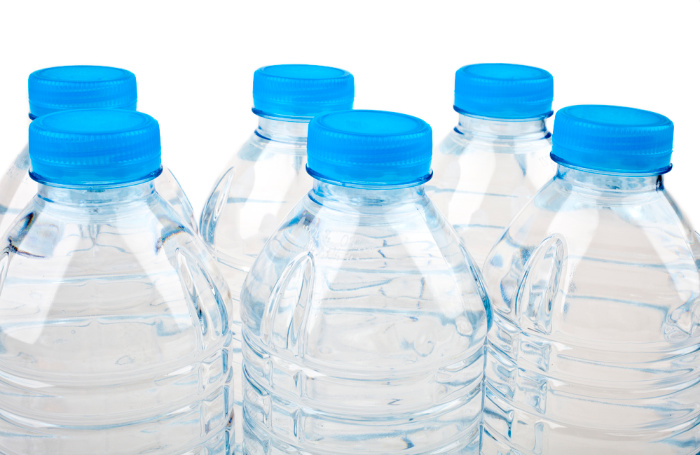













Money is so tight for so many people. I look forward to having a new administration to see how that helps! Great post.
Hi Jessica, I’m extremely concerned with how expensive every thing is. Thank you for your kind words. Linda
For many years I washed out jugs and stored water in them. I had a few hundred in a basement of the rent house we had. Was it ideal? No. Did it work? Yes
I marked the sketchy jugs non potable for washing clothes, flushing toilets and plant watering etc.
Now read and act accordingly on the cheap if needed.
https://www.ajc.com/news/atlanta-scrambles-to-prevent-water-crisis-from-spreading/DY2DFAF3SZCAVEUYSHQ6G3PGH4/
Matt, you and Linda are right. I am seeing more and more municipal water supply issues. Sometimes there is a water main break, sometimes it’s equipment issues. Being unable to use the municipal supply can last a few hours to weeks. The infrastructure for those systems is aging. Storms can damage systems and pipes.
Matt, thanks for your always valuable input!
Linda, I frequently encourage those close to me to read your blog, as well as forwarding your posts.
May you all have a blessed day!
Teddy
Hi Teddy, thank you for your kind words and sharing my articles. You are so right so many infrastructures are old and crumbling or falling apart. We may complain about all the orange cones redirecting traffic in the neighborhoods but it’s necessary to be ahead of the game for a disaster like Atlanta. Our power grids are the worst, please be prepared for power outages as well. Matt has had many experiences in his life that he shares and I’m so grateful. Linda
Hi Matt, it’s takes a disaster to wake people up. Thank you sharing that link. The water was gushing out of the ground. I quote from that article” Nationwide, a water main break happens every two minutes and an estimated 6 billion gallons of treated water are lost each day, enough to fill more than 9,000 swimming pools, according to a 2021 report by the American Society of Civil Engineers.” https://www.ajc.com/. What bugs me, the city is scrambling to give out cases of water to people. Really? Store water in whatever container you can like Matt said and label them. I just shake my head that the city has to babysit people who should have water stored in their homes. I will get off my soapbox, thanks Matt, Linda
Hello again! You both are so right! Thanks for the link, Matt. Many times people do not have room for enough water supplies and food supplies. When we lived in a large house on some property, we had room. Now in a far smaller place, room is rationed between all the needs. We had a water issue on the county side, resulting in no water till it could be repaired. I keep small 16 oz to 1 gallon bottles of water marked for the toilet in each bathroom. Essential!! That is in addition to stored potable water.
The infrastructure that worked so well decades ago has aged. We see the roads being repaired due to wear, tear and age. Makes me wonder about maintenance You probably have noticed how many storms create power outages.
Anyway, enjoy your day! I hope it is beautiful!
Teddy
Hi Teddy, you are so right space is an issue. But where there is a will we must find a way. Having some food and some water is better than none. Today is really a beautiful day, thank you, Linda
I had a pipe freeze and bust going to the shower.
I had no water for 4 weeks and 2 days. I had 30 gallon drums bought in 2011 and have lived in the garage since then.’
I am widowed and live alone. I used 3 full drums and was ready to start on the 4th one.
I was conservative with this water so it gives a gauge of how much one person uses that lives alone.
I gave away the empty drums and still have 8 filled.
I had a pipe freeze and bust going to the shower.
I had no water for 4 weeks and 2 days. I had 30 gallon drums bought in 2011 and have stored in the garage since then.’
I am widowed and live alone. I used 3 full drums and was ready to start on the 4th one.
I was conservative with this water so it gives a gauge of how much one person uses that lives alone.
I gave away the empty drums and still have 8 filled.
Hi JayJay, way to go you are prepared! Thanks for sharing how much water you used in 4 weeks and 2 days. Love this, Linda
I had a friend with a huge new house. She always commented on my stored food, saying she didn’t have room for a freezer!!
3 bedrooms furnished with no one living in the house but you seems a little excessive.
Yep—enjoy that 3 br furnished when you get hungry and your salmon price goes from $10 to 20 or isn’t even on the market…I guess some folks haven’t caught on that the deep state is trying to starve us using every way possible to install regulations and lawfare to shut down all they can.
Hi JayJay, it’s like when you see garages full of stuff, and the owners have fancy cars parked outside on the driveway. My car is a 2009 and I always keep it parked in the garage. I don’t need stuff. I need food and water, just sayin…..Linda
I’d like to have my email added to your mailing list. Thank you!
Hi Jim, it says your email is subscribed, please check your spam folder. Thank you so much, Linda
I am in the middle of a small issue. I LOVE a full pantry, and extra supplies give me peace of mind….BUT….and there is always a but, I am a minimalist. Clutter makes me nervous and panicky. I have extra large liquid soup containers in the basement for toilets and laundry, but I also see them as clutter. For me, it seems to be a fine line to walk.
Right now, I want to “cook down” my pantry, to start restocking in August. But what if there is a need in the meantime?? Help!!
Hi Chris, I love a full pantry as well. Years ago I would buy large containers of liquid soap, then I realized it was giving me anxiety, not sure why. So years ago I started buying smaller containers. Yes, I could fill the larger containers into the smaller bottles. But guess, what? I don’t want too. It may sound bratty but I decided I couldn’t do one more thing. I don’t have the strength I used to have. They may cost a bit more but I have to simplify my life. And my house doesn’t seem as crowded. We have two people living here. Two. We do not need the amounts we used to buy when we had our girls living here. Clutter bugs me as well. I get it. Do what your gut tells you. If you need to donate some of them to the food bank (will they take dish soap? or will the schools? Let it go. If your gut tells you that! Linda
I ment to say the liquid soap bottles are filled with water, for toilet and laundry needs.
Hi Chris, oh my gosh, LOL! I was thinking soap. Okay, let’s talk about how many you have. You know you need the water, but is it the number of the bottles that are hard to look at? What about replacing some every month with WaterBricks (3.5 gallons) or 5 gallon containers. The 3.5 gallon ones weigh 27 pounds if filled with water. The 5 gallons would be even heavier. You live in an HOA, right? You may not be able to put a 160 gallon high capacity or larger in your garage. Are they expensive, yes. Or you can do one of my favorites; BlueCans (cheapest place to buy them is at Brownells: https://www.brownells.com/gear/survival-gear/water-hydration/blue-can-water/?sku=100016208. I only buy the 24 cans to a box. If you sign up for their emails they have free shipping some times and the first time you sign up you get a discount. People always comment they are so expensive, but are they? They stack easily in my closet and last for 50 years (they have a safe coating inside the aluminum cans). I bet I have 50 cases, did I buy them all at once, no. I have Waterbricks and high-capacity tanks and the BlueCans are by far my favorite water. Set and forget. Linda
I quit storing toilet tissue a long time ago and had switched to the compressed coin tissues that you can fluff up with just one drop of water. A box of 500 coin tissues used to be about $25, but they have gone up in price so much that I even quit buying them. Now I order coffee filters from Sams Club (less expensive there) for a toilet tissue substitute. I haven’t counted them, but I have a LOT. I open the packages, nest the filters together in rows, squash them down as much as I can, and fill tote boxes with them. I could get more in a box if I used vacuum bags. I stack all the totes in a corner of my bedroom. Clutter does not bother me, fortunately. I will just have to remind everyone not to flush the coffee filters!
Hi Angela in North Florida, wow, I just looked and they have gone up in price substantially!! I like your idea of the coffee filters, love it, Linda